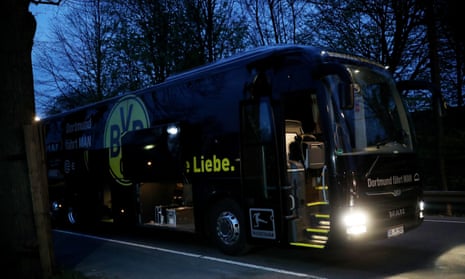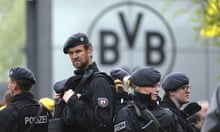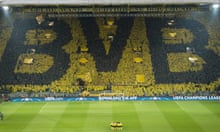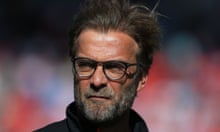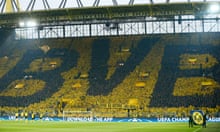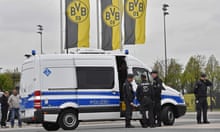After the explosives attack on the Borussia Dortmund football team, police followed leads pointing to radical Islam, far-right hooligans and leftwing activists.
In the end, their investigations led them to an entirely new category of extremism: terror fuelled by financial greed.
On Friday, German police arrested a 28-year-old German-Russian national on suspicion of having carried out the explosives attack on Dortmund’s team bus in order to collapse the club’s share price so he could profit from stock market speculation.
Sergej W is also accused of having left behind several copies of a faked letter that tried to frame the attack as an act of Islamist terror.
The suspect was arrested by special operation officers on his way to his workplace at the University hospital in the southern town of Tübingen at 6am on Friday. On the day of the attack, 11 April, he had bought a put option – an option to sell assets at an agreed price on or before a particular date – on Borussia Dortmund’s shares, giving him the right to sell the shares for a specified price at a predetermined date.
Had the explosives killed a member of the team and the club’s share price dropped, the value of his put option would have increased significantly.
According to German media reports, Sergej W bought 15,000 put warrants for €78,000(£65,300) and could have gained up to €3.9m as a result of a large drop in Dortmund’s shares.
As outlandish as such a plot may first appear, it would explain why Borussia Dortmund became the first football team to be directly targeted by what looked like a terrorist attack: Dortmund is the only club in Germany to float shares on the stock market.
If the club’s share price had dropped by more than half after the attack, a speculator could have got a return of €1m on an investment of a couple of thousand euros.
Dortmund’s share price did drop temporarily after the incident, but only by 5%. After the suspect’s arrest on Friday, the club’s share price rose by 4%, from €5.46 to €5.58.
Police were first alerted to unusual activity on the stock exchange only a day after the attack, but had initially dismissed the lead. Employees of Comdirect, an online broker attached to the German bank Commerzbank, later contacted police about Sergej W’s unusual purchase over suspicions of money laundering.
Because Sergej W had purchased the put options online from his hotel room, police were able to identify him via the hotel’s IP address.
The team bus was heading to their stadium for a Champions League match against Monaco last Tuesday when three explosions occurred, wounding the Spanish defender Marc Bartra and delaying the match by a day.
The professional nature of the attack initially led investigators to suspect a terrorist dimension to the attack.
Three identical printed statements found near the crime scene – one attached to a post, the other placed inside the hedge where the explosiions occurred – had mentioned last December’s Islamist terrorist attack on a Berlin Christmas market and referenced the “caliphate”, initially seeming to corroborate investigators’ suspicions of a radical Islamist motive.
Two other statements then appeared online, claiming the attack was driven by far-left and far-right motives. But after consulting terrorism experts, investigators increasingly began to doubt the authenticity of the three statements.
The possibility that a stock-market speculator was behind the assault on the lives of one of Germany’s popular football teams would at that stage have required a lively imagination.
Sergej W, who grew up in the town of Freudenstadt in the Black Forest and whose parents are originally from the Ural mountains, is seen as the likely sole architect of the attack. Germany’s criminal prosecutor said on Friday there was no indication that the 28-year-old had any accomplices.
It remains unclear how the suspect was able to get hold of the explosives used in the attack. According to news magazine Der Spiegel, Sergej W had carried out his military service in 2008, where he worked as a electrician supporting an army medical unit.
Other reports in the German press pointed out that Sergej W has completed an apprenticeship prize as a electronics technician, winning an educational prize for technical engineering in July 2015.
Newspaper Bild quoted anonymous investigators who said W’s “above-average” knowledge in the field of electronic engineering could have allowed him to install and trigger the explosives remotely on his own. Police are searching four separate apartments in connection with the attack.
The suspect had first booked a room at L`Arrivée hotel, where the Dortmund team typically stays for home matches, in mid-March. He had also booked a room for the periods of 9-13 April and 16-20 April, at a stage where it was unclear whether Dortmund’s home match against Monaco would be in the first or second leg of the Champions League quarter-final.
During check-in, the suspect reportedly rejected the first room offered to him because it did not have a window pointing facing the road where the explosives had been installed. His second room, in the attic, had a clear view of the location.
According to Bild, L`Arrivée employees had become suspicious of Sergej W shortly after the explosion: while other guests ran around the hotel in a panic, he walked calmly into a restaurant and ordered a steak. His hotel bill showed that he had later ordered a massage.
In a press statement on Friday, Germany’s criminal prosecutor said the faulty installation of the explosive devices may have saved the players’ lives. While the first and last of the devices had been installed near ground level, the middle one was placed roughly one metre above the ground – too high to cause maximum damage, according to police.
Metal pins fitted to the devices – 70mm wide, 6mm in diameter and weighing 15g each – were found 250 metres from the site of the explosions. One was found lodged in the headrest of a seat in the back row of the bus.
The German interior minister, Thomas de Maizière, on Friday described the attack as “driven by a particularly abominable form of greed”.
Borussia Dortmund, whose club name references the New Latin word for Prussia, became the first German football to float on the stock market in 2001 – an experiment that brought the club to the brink of bankruptcy.
After a euphoric stock market launch that earned the club €140m, Dortmund invested heavily in new players but failed to turn its new spending power into sporting success. In July 2004, several players complained they had not received their wages, and by 2005, the club had racked up debts to the tune of €118m.
Under a new management, Borussia gradually repaid its debts and eventually returned to sporting glory, winning the Bundesliga title under current Liverpool coach Jürgen Klopp in 2011 and 2012. The bad hangover of the mismanaged stock-market launch seem to have been banished.
Few would have imagined that after nearly killing off the club once, the stock market would literally drive its first team to a brush with death years later.
The put option
The suspect in the Borussia Dortmund bomb attack allegedly aimed to turn a profit from the collapse of the club’s share price after a terrorist attack.
His efforts appear to have failed. Anyone wanting to make money from a fall in share prices has two obvious strategies: short selling or buying a put option. Short sellers sell a share they have borrowed with the hope of buying it back at a cheaper price when the shares have fallen in value. Buyers of put options are striking a deal to be able to sell a share at a predetermined price.
German prosecutors allege that the suspect behind the Borussia Dortmund bomb attack was using the latter to try to turn a profit.
Sergej W is said to have bought 15,000 put options on 11 April. The shares in the club had closed that day at €5.61, before the attack took place. The shares fell as low as €5.50 the following day.
According to Bloomberg, the strike price on the put options was €5.20. If correct, the suspect was a long way from making any money because the share price had not fallen very far. He could only turn a profit if the shares fell below that level by 16 June, when the option expires.
German police have not said how much money they believe the suspect stood to make or confirmed the level at which the options were priced.
